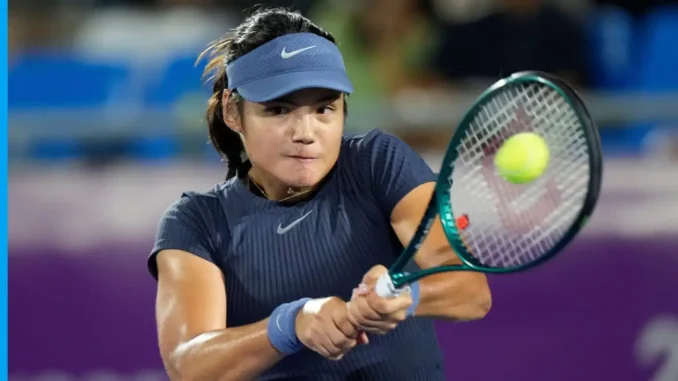
In the crucible of professional tennis, where a single swing can shift the arc of a career and expectations hang heavier than a monsoon-soaked court, Emma Raducanu stands on the cusp of transformation. The 22-year-old Briton, whose 2021 US Open triumph catapulted her from wildcard obscurity to global stardom, has navigated a turbulent odyssey of injuries, coaching upheavals, and unrelenting scrutiny. Now, as Beijing’s crisp autumn air heralds the WTA 1000 China Open—one of the 2025 season’s final marquee events—Raducanu finds herself with a rare chance to vault into the sport’s elite ranks. A favorable draw positions her not merely to climb the WTA rankings but to soar, potentially securing a coveted top-32 seed for the 2026 Australian Open and quieting critics who once doubted her resilience. This is no mere tournament; it’s a stage for Raducanu to rewrite her narrative and cement her comeback.
The road to Beijing has been paved with thorns. Earlier this season, Raducanu sparked controversy by opting out of Great Britain’s Billie Jean King Cup finals to chase individual glory at the Korea Open in Seoul. The decision drew sharp rebukes from fans and pundits who believed national duty should trump personal ambition, especially as her teammates faltered against a formidable USA squad led by Jessica Pegula in the semi-finals. For Raducanu, it was a calculated risk, rooted in a steely focus on her long-term trajectory. “I’ve always prioritized my long-term development,” she might assert, her words a shield against the storm of criticism. Seoul, though ending in a heart-wrenching second-round defeat to Barbora Krejcikova, showcased her evolving mettle. Pushing the two-time Grand Slam champion to three match points in a grueling three-setter, Raducanu fell short but emerged emboldened, her performance a testament to a resilience forged through adversity—a stark contrast to the injury-riddled seasons that once threatened to derail her.
In Beijing, the stars align for Raducanu’s redemption. As a seeded player in this WTA 1000 event, she enjoys a first-round bye, guaranteeing second-round ranking points before she even steps onto the court. Her opening challenge comes against a qualifier, who must first overcome Croatia’s Donna Vekic, a baseline bruiser known for her relentless groundstrokes. Should Vekic prevail, it would mark their first tour encounter—a test of Raducanu’s sharpened movement and tactical nous. With no points to defend from last year’s China Open, every win here is a windfall, a chance to stack points and momentum in a season where she’s already logged a career-high 19 tournaments. Her recent form—marked by flashes of brilliance in Seoul and earlier victories over top players—suggests she’s ready to seize the moment.
The tournament’s true drama awaits in the third round, where world No. 7 Jessica Pegula looms as a potential blockbuster foe. The matchup carries a charge of history: Raducanu stunned Pegula at Eastbourne in 2024, her first top-10 scalp, a victory that felt like a turning point after years of near-misses. Their Miami Open quarter-final clash earlier this year was a showcase of Raducanu’s growing maturity, trading ferocious rallies with the American’s relentless consistency. Pegula remains a daunting obstacle, but Raducanu sees these battles as litmus tests of her ascent. “I think depending on the day, depending on how we match up, I’m getting better overall,” she reflected recently, her confidence tempered by perspective. “I think I’m improving for sure in the last few months. So I just need to keep consistent and put this one behind.”
Beijing’s points structure is a siren song for ambition. A third-round appearance nets 65 points—a modest but meaningful step. Reaching the fourth round yields 120, while a quarter-final berth delivers 215—a haul that could propel her toward the top 30. A semi-final run, uncharted territory for Raducanu at a WTA 1000, would bring 390 points, a transformative leap. With the Wuhan WTA 1000 on the horizon, her path to the top 32 by January 2026—the seeding threshold for Melbourne Park—feels tantalizingly close. “So I’ve just got to do my best in the next few months until Australia to just keep working to try and close the gap and try and get seeded for Melbourne,” she declared, her ambition laced with the humility of one who’s endured both triumph and tribulation.
This moment is no fluke; it’s the fruit of a career painstakingly rebuilt. Since her US Open fairy tale, Raducanu has battled through surgeries, cycled through seven coaches, and shouldered the weight of prodigy status. Her 2025 season has shattered doubts about her endurance, with 19 events proving her physical and mental fortitude. Her game has evolved under coach David Roig: fewer unforced errors, a more versatile serve, and a knack for clutch moments honed through grueling matches like Seoul’s. Even in defeat to Krejcikova, her ability to hold serve under pressure signaled a player on the verge of greatness.
As Beijing’s courts come alive, the tennis world watches Raducanu with anticipation. A deep run could redefine her trajectory, vaulting her into the top 25 and cementing her as a force for 2026. Picture the scene: a trophy lifted against the backdrop of the Forbidden City, or at least a points haul that anchors her as a top-30 fixture. For a player who’s danced on the precipice of brilliance, Beijing feels like destiny’s call. With Wuhan and Melbourne looming, Raducanu’s resurgence isn’t just possible—it’s palpable. In tennis’s relentless arena, she’s building her legacy, one defiant, dazzling point at a time.
Leave a Reply